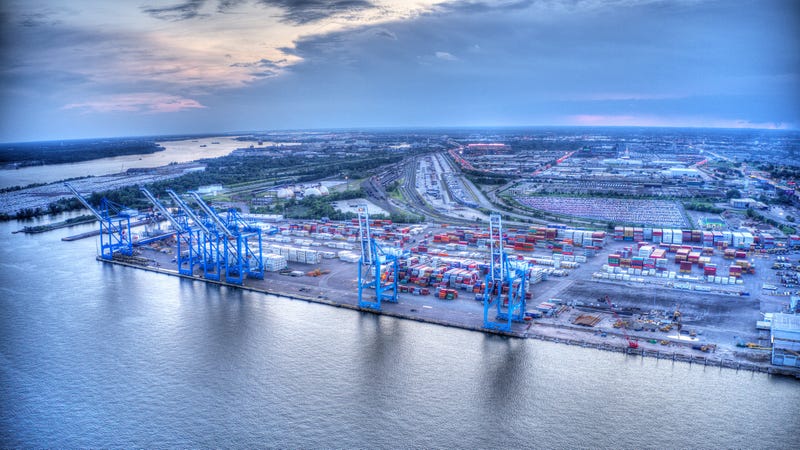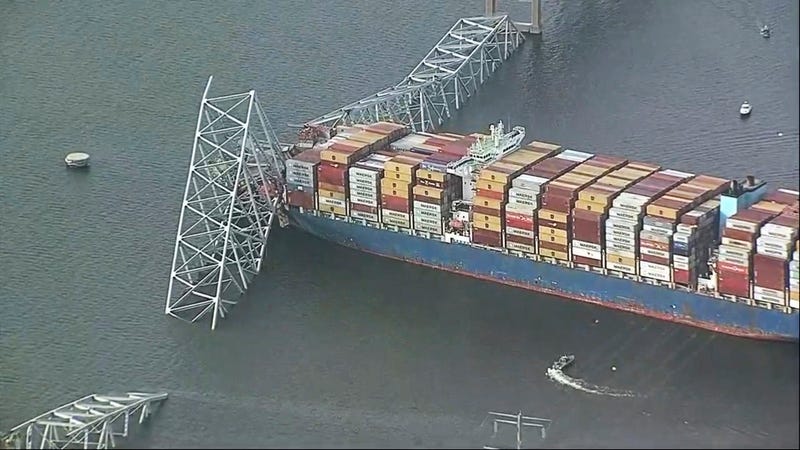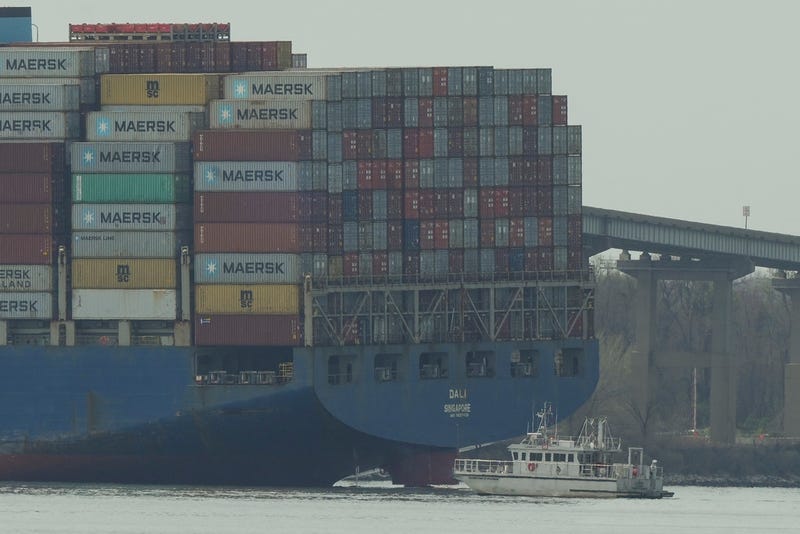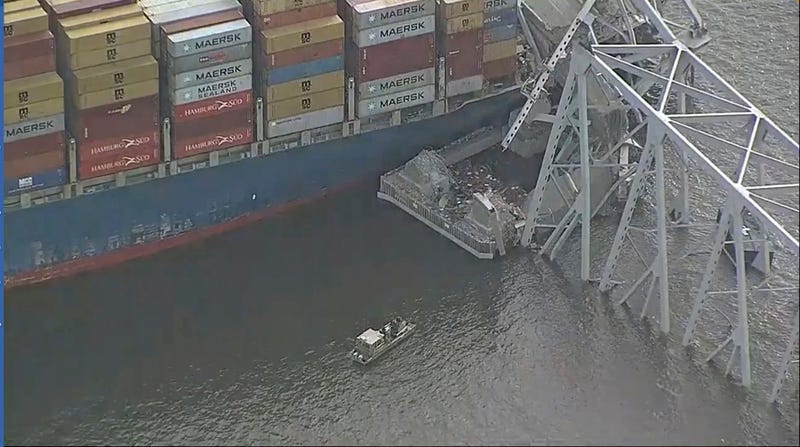
Last updated 8:30 p.m.
PHILADELPHIA (KYW Newsradio, AP) — After the powerless container ship Dali early Tuesday morning rammed a support column of Baltimore's Francis Scott Key Bridge, sending the twisted span plunging into the Patapsco River, six workers who had been filling potholes are still missing, and ship traffic in and out of the Port of Baltimore is suspended.
With all six workers presumed dead, Ryan Mulvy, director of government and public affairs at PhilaPort, says thoughts and prayers are with the victims’ families.
He says Philadelphia is equipped to lend support to any cargo ships in need of an alternative port.
“If we need to help with the diversion of some of those ships, we are prepared to handle the same cargo that the Port of Baltimore handles. We are all experts in those kind of cargoes.”
Last year, the Port of Baltimore handled a record 52.3 million tons of foreign cargo worth $80 billion, according to the state. Ships that pass through the port could be carrying anything from nuts to Nissans. In fact, it's the busiest port for car shipments in the U.S., and a lengthy closure could disrupt the supply of new vehicles.
About 20% of U.S. coal exports pass through Baltimore en route to India, the Netherlands, Japan and other countries — second only to Norfolk, Virginia, according to the U.S. Energy Information Administration.
"I think we all showed during COVID that we can rely on each other and rally,” Mulvy said. “Whether it’s a pandemic or a tragedy, we'll find a way — through the port community, through our truckers and labor — to make sure that these goods move. We just want to give proper time."
Effect on shipping and freight
The Dali was the only container vessel in the port at the time of the collision, but seven others had been scheduled to arrive in Baltimore through Saturday, said Judah Levine, head of research for the global freight booking platform Freightos.

Americans should expect shortages, said Ryan Petersen, CEO of the supply chain management company Flexport. He said the accident would have significant repercussions for ocean container shipping and East Coast trucking logistics.
“It’s not just the port of Baltimore that’s going to be impacted,” he said.
Petersen was working with his team Tuesday to reroute about 800 shipping containers currently making their way to the Port of Baltimore. Flexport had two containers onboard the Dali; one was filled with a donated playground headed to Zambia.
“It’s a scramble because each of those containers has now a new journey to clear customs. You’ve got to get a different truck to pick it up at a different port. It creates a whole lot of downstream work,” he said.
Petersen said the attacks on cargo ships in the Red Sea, which started amid the Israel-Hamas war, have already forced ships to avoid the Suez Canal and take a longer route around the southern tip of Africa. More ships have had to sail more often, and congestion in the Panama Canal has increased.
With U.S. importers increasingly shifting to West Coast ports that in turn may experience their own backups, “you get this vicious feedback loop,” he said.

The use of trucks as an alternative to shipping goods will also cause traffic backups on U.S. thoroughfares, Petersen predicted. “The East Coast I-95 corridor is going to be a real disaster,” he said.
American Trucking Associations spokesperson Jessica Gail says 1.3 million trucks cross the Key bridge every year — 3,600 a day. Trucks that carry hazardous materials will now have to make 30 miles of detours around Baltimore because they are prohibited from using the city's tunnels, she said, adding to delays and increasing fuel costs.
"Aside from the obvious tragedy, this incident will have significant and long-lasting impacts on the region," Gail said.
Effect on regional economy
The collapse is likely to have an outsize impact on the regional economy around Baltimore and on businesses that rely on shipments of steel and cars that come through the port.
The Port of Baltimore is one of the largest vehicle handling ports in the U.S. In 2022, Baltimore ranked No. 1 with more than 750,000 vehicles going through the port, 70% of them imports, according to the publication Automotive Logistics. However, supply chain experts say the Port of Los Angeles and others may have overtaken it last year based on the value of autos passing through.
And since most vehicles purchased in the U.S. are made in North America and don't come by sea, experts do not expect big problems. Car dealers currently have sizable inventories, and ships carrying cars also can divert to other ports.

In the Baltimore area, “if you’re in the construction business and you haven’t piled up enough steel because of (high) interest rates, then there’s a good chance you’re going to run out of steel,’ said Ami Daniel, CEO of the maritime intelligence company Windward in Tel Aviv, Israel. “If you’re in the shipbuilding or construction business, it can slow down your project.’’
Still, Levine thinks the bridge collapse is unlikely to have a big impact on global trade, certainly nothing like the disruptions caused by the COVID-19 pandemic. First, Baltimore is not a major port for container vessels. And second, shipping traffic from Asia is in the annual lull following China's Lunar New Year holiday.
While shipments are pushed forward to get things out ahead of the holiday in early February, the period afterwards “is the slow season for ocean freight,” he said.
There will be “some degree of confusion and bottlenecking” for a time, predicted Thomas Goldsby, a professor of supply chain management at the University of Tennessee. However, said Goldsby, shipping companies have become accustomed to taking detours to other ports in recent years due to conflicts along the Suez Canal or low water levels in the Panama Canal.
“These steamship lines are having to be agile to the circumstances,” Goldsby said. “The other ports are ready to receive. What is a challenge for Baltimore is an opportunity up and down the coast.”
